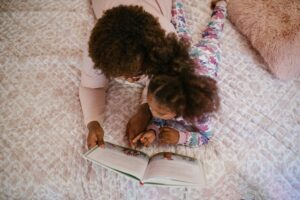It is a key tenet of teaching that building strong relationships with and among students is vital to having a successful school year. Strong relationships between teachers and students prevent undesired behaviors in the classroom, give insight into students’ preferred learning styles, and promote skills that build empathy. Strong relationships among students provide opportunities for mutual understanding and the application of empathy building skills.
High-quality relationships in classrooms take time and intentionality to develop. It is a year-long process that requires planning, maintenance, and patience, yet, the impacts of building strong relationships in the classroom are long-lasting for both teachers and students.
Read more to learn about some strategies that can help to build relationships with and among students.
Implementing Community Building Circles
Community building circles are a foundational strategy to generate empathy and high-quality relationships with and among students. Community building circles are opportunities for students to share about themselves and learn about others in a space dedicated to connection. In the circle, all voices are treated equitably and with respect. Community circles are also great spaces to practice using restorative communication skills, like active listening and “I” statements, so that they can be used later to process conflict.
Passion Projects
Passion projects are a great way to intertwine academic learning standards, getting to know your students, and helping your students to learn more about themselves!
Passion projects are projects in which students identify a topic that interests them, ask questions about that topic, and attempt to answer those questions through research. The teacher’s role in structuring passion projects is to guide students along the inquiry process, to teach them the fundamentals of researching and critical thinking, and to support students in determining ways to show their learning. The great thing about passion projects is that they can be structured any way that fits your teaching style and the students’ learning styles and can be of varying lengths of time. You can start lessons by modeling various skills with your own topics of interest, helping the students to learn more about you as well.
Passion Projects can be completed independently or in groups and students can present their projects in whatever way feels comfortable for them. These are also a great way to soft start the year and energize your students to get into the school spirit and to share a bit about themselves with you and with their classmates!
Mindful Moments
Mindful moments are times to encourage self-reflection, for students and teachers alike to check in with themselves and re-regulate during the school day. These are great to use after assessments, when the class is struggling to settle down, or if you are feeling dysregulated (a sense of feeling overwhelmed or out of control due to a heightened emotional state or overlapping environmental factors). Mindful moments can be:
- guided meditation – an activity where a teacher or narrator guides participants through a meditation
- breathing exercises – intentional, measured breathing that can calm the mind and the body
- grounding exercises – activities that encourage being in the present moment
- physical movement – types of movement that release excesses of energy or tension
- Or any activity that requires students to pause and take stock of their physical and mental space.
Mindful moments should be integrated into the classroom with structure, scaffolding, and practice. It is also a good idea to describe the circumstances which led to the need for a mindful moment using “I” statements to name observable behaviors without judgment. Starting this practice of taking a moment to check in with yourself and re-regulate when needed will support students with being aware of their emotional state when in conflict. They will be able to identify when they need to take a moment rather than acting out in a heightened emotional state.
To learn more about community building circles, restorative communication skills or to bring a Restorative Practice Training workshop to your school/organization, please contact us.




